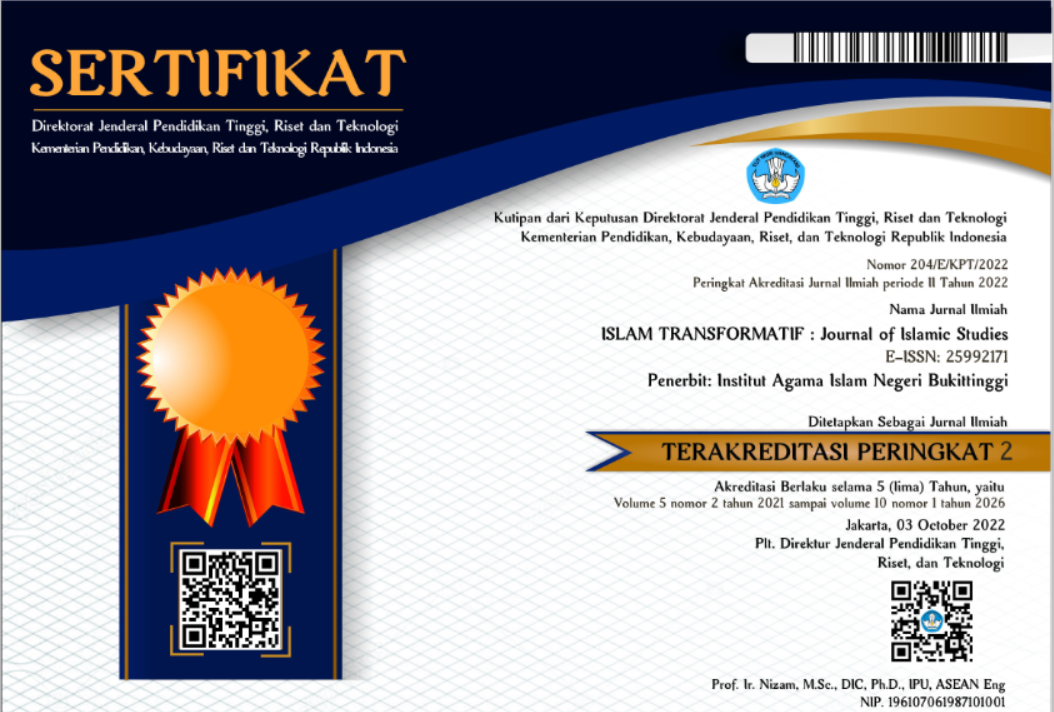TEORI PEDAGOGIK PENDIDIKAN MAHMUD YUNUS
DOI:
https://doi.org/10.30983/it.v3i2.2342Keywords:
Mahmud Yunus, Teori Pedagogik, Pengembangan, Pendidikan Islam, SekolahAbstract
References
Alfurqan, Alfurqan, Rini Rahman, and Muhamad Rezi. “Pendidikan Orang Dewasa Yang Dikembangkan Rasulullah.†ISLAM TRANSFORMATIF : Journal of Islamic Studies 1, no. 1 (August 7, 2017): 15–29. doi:10.30983/IT.V1I1.327.
E. Nugroho. et.al, Ensiklopedi Nasional, vol. 17, Jakarta: PT. Cipta Adi Pustaka, 1991.
Ghazali, A. Syukur, Pembelajaran Keterampilan Berbahasa; Dengan Pendekatan Komunikatif-Interaktif, Bandung: Aditama, 2010.
Ghofur, Saiful Amin, Profil Para Mufassir al-Quran, Yogyakarta: Pustaka Insan Madani, 2008.
Hashim, Rosnani, Reclaiming the Conversation: Islamic Intellectual Tradition in the Malay Archipelago, The Other Press, 2010.
Hermawan, Acep, Metodologi Pembelajaran Bahasa Arab, Bandung: PT Remaja Rosdakarya, 2001
Ibrahim, Sulaiman, Pendidikan dan Tafsir “Kiprah Mahmud Mahmud Yunus dalam Pembaruan Islamâ€, Jakarta: LEKAS, 2011.
Muhammad, Herry, Tokoh-Tokoh Islam yang Berpengaruh Abad 20, Jakarta: Gema Insani, 2006.
Muliati, Indah, and Muhamad Rezi. “Tujuan Pendidikan Dalam Lingkup Kajian Tafsir Tematik Pendidikan.†ISLAM TRANSFORMATIF : Journal of Islamic Studies 1, no. 2 (2018): 177–90. doi:10.30983/IT.V1I2.475.
Nata, Abuddin, Tokoh-Tokoh Pembaruan Pendidikan Islam, Jakarta: Raja Grafindo Persada, 2005.
Rahman, Rini, Dinovia Fannil Kher, and Yati Aisha Rani. “Pendidikan Islam Bagi Remaja (Upaya Penguatan Karakter Dengan Pendekatan Agama.†ISLAM TRANSFORMATIF : Journal of Islamic Studies 1, no. 2 (March 6, 2018): 95–104. doi:10.30983/IT.V1I2.473.
Ramayulis, Sejarah Pendidikan Islam; Perubahan Konsep Filsafat dan Metodologi dari Era Nabi SAW sampai Ulama Nusantara, Jakarta: Kalam Mulia, 2011.
Ramayulis & Samsul Nizar, Ensiklopedi Tokoh Pendidikan Islam; Mengenal Tokoh Pendidikan di Dunia Islam dan Indonesia, Ciputat: Quantum Teaching, 2005.
Rina, Malta, Pemikiran dan Karya Prof. Dr. Mahmud Yunus Tentang Pendidikan Islam (1920-1982). http://pasca.unand.ac.id/id. diunduh pada 26 Mei 2016.
Yunus, Mahmud, Riwayat Hidup Prof. DR. Mahmud Mahmud Yunus, Jakarta: Hidakarya, 1982.
____________, Sejarah Pendidikan Islam di Indonesia, Jakarta: Mutiara, 1995.
_____________, Pokok-pokok Pendidikan dan Pengajaran, Jakarta: Hidakarya Agung, 1990.
_____________, Metodik Khusus Pendidikan Agama, Jakarta: Hidakarya Agung, 1980.
Zuhairini dkk, Sejarah Pendidikan Islam, Jakarta: PT Bumi Aksara, 2004.
Downloads
Published
How to Cite
Issue
Section
Citation Check
License
Authors who publish with this journal agree to the following terms:
- Authors retain copyright and grant the journal right of first publication with the work simultaneously licensed under a Creative Commons Attribution-ShareAlike 4.0 International License that allows others to share the work with an acknowledgment of the work's authorship and initial publication in this journal.
- Authors are able to enter into separate, additional contractual arrangements for the non-exclusive distribution of the journal's published version of the work (e.g., post it to an institutional repository or publish it in a book), with an acknowledgment of its initial publication in this journal.
- Authors are permitted and encouraged to post their work online (e.g., in institutional repositories or on their website) prior to and during the submission process, as it can lead to productive exchanges, as well as earlier and greater citation of published work (See The Effect of Open Access).




